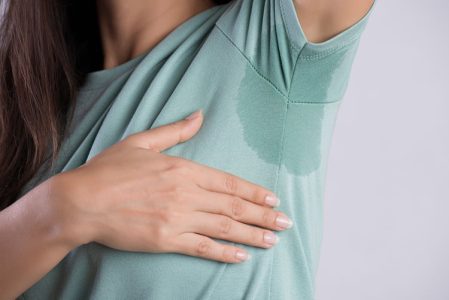Hyperhidrosis (Excessive sweating)

Hyperhidrosis is excessive or severe sweating due to hyperactive sweat glands, and is usually localised to areas with high concentration of sweat glands. Common areas include the armpits, palms and soles. The affected areas are constantly wet or damp, and can interfere with quality of daily living and cause significant embarrassment and distress.
Sometimes hyperhidrosis may be more extensive causing generalised excessive sweating affecting most or all parts of body, for such cases it is important to evaluate for any underlying medical conditions.
Treatment for Hyperhidrosis
The treatment ladder ranges from simple topical treatment to more invasive surgery options. It is important to discuss the benefits and side effects of each treatment option, so that patients can make an informed decision on their preferred treatment.
Topical anti-perspirant treatment
This may be applied regularly on the sweaty areas.
Iontophoresis
This is useful for hands and feet hyperhidrosis, regular treatment with hands feet soaks in solution with low-energy electric currents may help reduce sweating.
Oral medication
There are available drugs generally reserved for treating extensive generalised sweating. These medication has side effects and need to be used with close monitoring.
Botulinum toxin (Botox) injection
This is an effective and quick method which can be used to control localised areas of sweating at the armpits, hands and feet. Multiple little injections of Botox can be placed in these sweaty areas, and are generally well tolerated with the use of numbing cream prior to injections. The effect of Botox can usually last up to 6 months, before sweating recurs and top-up treatment is required.
Surgery
There are more invasive surgical options with the aim of a more permanent treatment to localised sweaty areas. Surgical removal of sweat glands, and sympathectomy (where nerve fibres controlling the sweat glands are burned off) can be discussed with the surgeon.
DISCLAIMER:
The information written and published on this website is not intended to substitute the recommendations of a trained professional and does not replace a professional consultation.
It is advisable to undergo a formal consultation to help establish a relationship between the doctor and yourself, accurately determine your concerns/problems, and get the appropriate treatments for them.
It is also imperative to note that the contents of the website with respect to treatments, results and pricing can vary from individual to individual, and can only be accurately determined by the doctor upon diagnosis.
Do note that all medical treatments will only be administered upon proper consultation, with the requirement that patients be above 21 years of age to provide legal consent.
Medical Dermatology
Meet your Dermatologist

Dr Tay Liang Kiat
Dermatologist
Dr Tay Liang Kiat is a fully accredited Dermatologist who specialises in skin cancers, Mohs micrographic surgery, dermatologic and nail surgery, aesthetic dermatology and laser procedures. With more than 20 years of clinical experience, he also manages other aspects of general ambulatory and inpatient dermatology, including eczema, psoriasis, acne, urticaria, hair loss, children skin issues and other complex medical dermatology. In addition, he has expertise in the use of the latest immunotherapy (biologics) treatment for severe eczema, psoriasis and urticaria.




